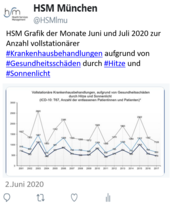Potentially avoidable hospital admissions in Germany – an analysis of factors influencing rates of ambulatory care sensitive conditions.
| Autoren/Herausgeber: |
Burgdorf, F. Sundmacher, L. |
|---|---|
| Erschienen: | 2014 |
| Publikationsart: | Articles in Refereed Journals (International) |
| ISBN/ISSN: | 1866-0452 |
| erschienen in: | Deutsches Ärzteblatt International |
| Weitere Quellenangabe: | 111(13): 215-223 |
Abstract
Background
The concept of ambulatory care sensitive hospitalization (ACSH) is based on the assumption that hospitalization for certain conditions might have been avoided by the timely provision of appropriate care outside the hospital. As preventive care and early treatment are often carried out in the ambulatory setting, ACSH have come to be viewed as an indicator of quality for this sector of the health-care system.
Methods
Factors potentially influencing the regional distribution of ACSH were examined for four conditions—congestive heart failure, angina pectoris, arterial hypertension, and diabetes mellitus—with separate analyses for men and women. A regression analysis was performed on the basis of German nationwide data for the year 2008 (hospital statistics and population statistics). The data covered all areas of Germany.
Results
Each rise in the density of practice based specialists by 1 per 100 000 inhabitants was associated with a 0.1% reduction of ACSH in general and with a 0.3% reduction of ACSH for diabetes among men. A corresponding rise in the density of general practitioners was associated with reductions of ACSH among men by 0.1% for heart failure and by 0.5% for hypertension, yet also with increases of ACSH for angina pectoris (0.2% rise) and for diabetes (0.4% rise). Unemployment, residency in a rural area, and the number of hospital beds available locally were all positively correlated with small rises the ACSH rate. An age of 65 years and older was associated with the highest ACSH rates (0.7% to 3.6%).
Conclusion
Overall, the analyzed variables were only weakly associated with the frequency of ambulatory care sensitive hospitalization. Future studies should consider further aspects such as the quality of care, comorbidities, and participation in healthcare programs.





